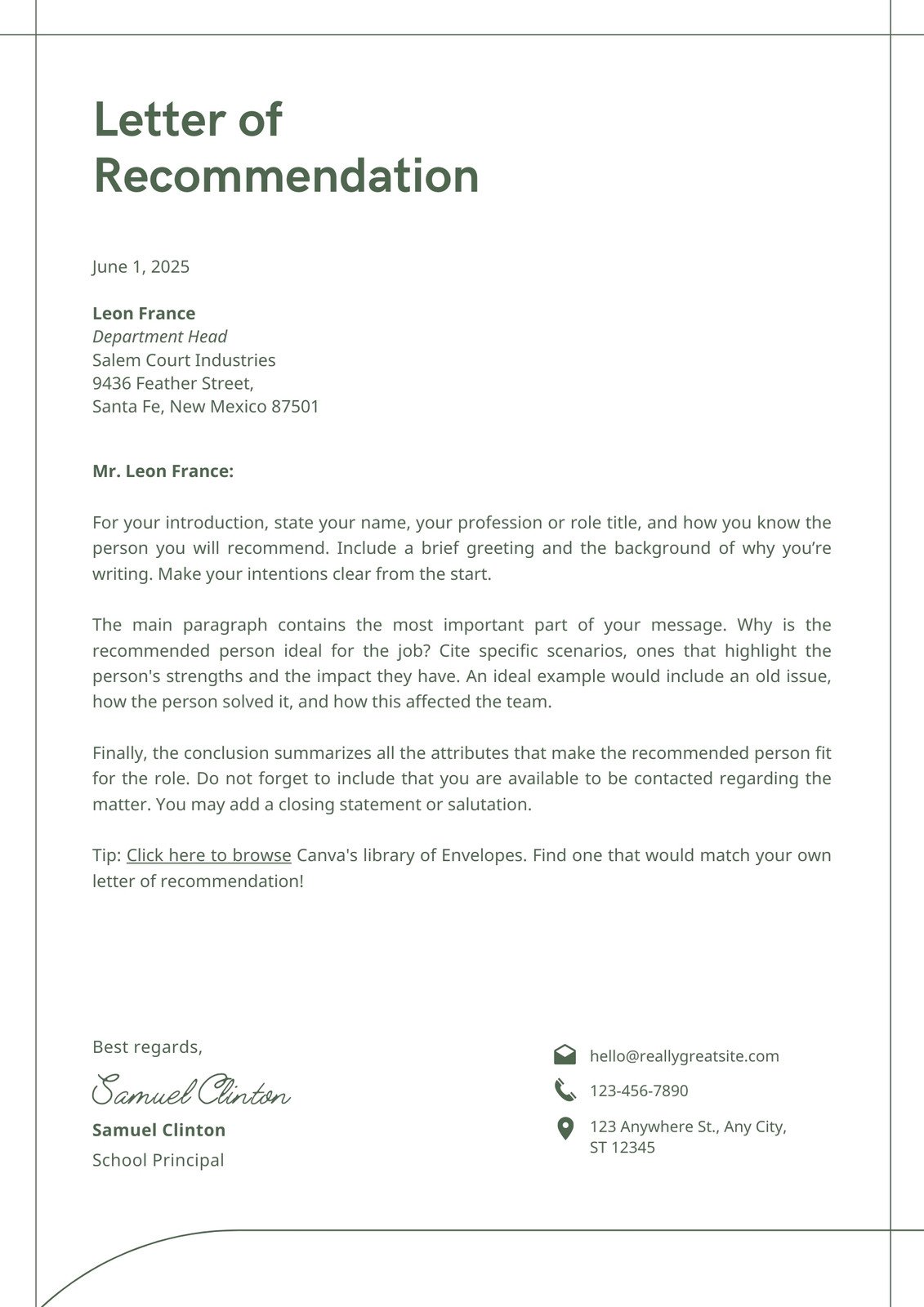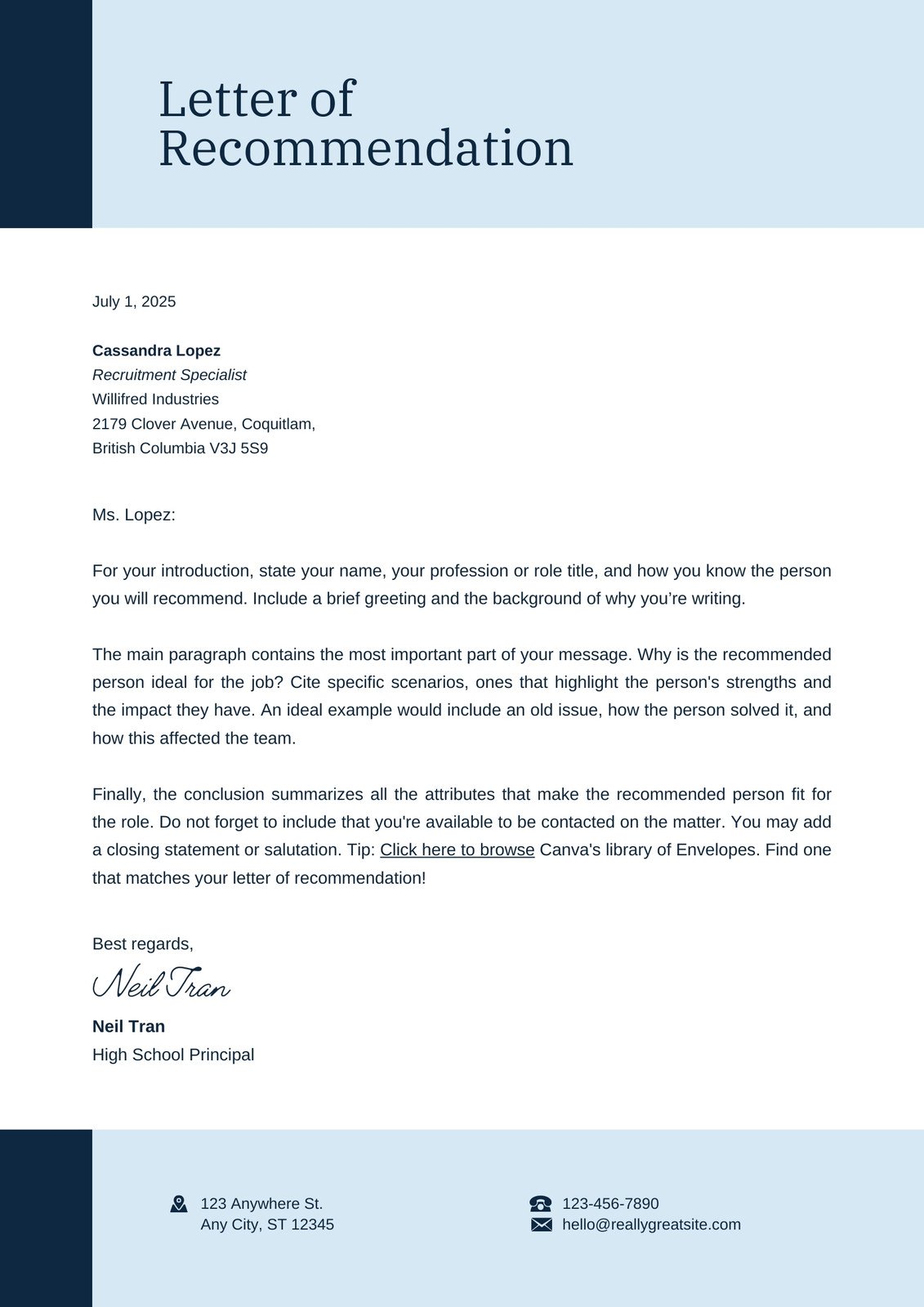Getting into your dream university can become quite easy if you have Letters of Recommendation (LORs) supporting your application. In this guide, we explain what an LOR is, how to write one, correct formatting, vocabulary tips, and differences between academic and professional LORs
LOR Full Form & Meaning
The full form of LOR is Letter of Recommendation. It is a document written by a professor, project guide, employer, or supervisor who can accurately describe your skills, strengths, performance, and character. Universities use LORs to judge whether a student is prepared for advanced academic or professional environments.
What is a Letter of Recommendation(LOR)?
A Letter of Recommendation is a third-party evaluation of your academic or professional capabilities. It provides insights that your SOP or resume cannot, such as your work ethic, behaviour, attitude, teamwork, leadership, and growth.
A strong LOR adds credibility to your achievements because it comes from someone who has directly observed your work.
Types of Letter of Recommendation (LOR)
There are two main types of LORs depending on the context and the designation of a recommender, the LORs can be broadly classified into two categories:
1. Academic LOR
A Professor, Department Head, or Dean at your college or university provides an Academic LOR. It presents an account of your academic performance, achievements, and strengths. Academic recommendation letters must be issued only on the university or college letterhead.
The Academic LORs are more prominent for those planning to apply for a Masters (MS) program. Generally, universities require 2-3 LORs, and applicants should ensure each LOR is distinctive yet relevant to the program they are applying for.
Important attributes to mention in an Academic LOR:
- Academic performance in a subject
- Relevant Projects and Research Work
- Co-curricular initiatives and achievements
- Specific incidents conveying the expertise or work ethic
2. Professional LOR
A professional recommendation letter is issued by a former employer, supervisor or reporting manager you have worked with.
Most Business Schools abroad demand a set amount of work experience from the applicants. Therefore, they require professional LORs to evaluate your practical, hands-on skills better.
A professional recommendation letter differs from an academic one in that it chiefly revolves around your professional and leadership skills. Also, these will be issued only on the organisation's letterhead, duly signed and stamped.
Your recent employer or manager could help prepare a recommendation letter that uniquely paints an impactful picture of your technical and managerial skills.
Essential attributes to mention in a Professional LOR:
- Leadership ability
- Areas of expertise
- Soft skills
- Specific work incidents highlighting your strengths
How to Write a Letter of Recommendation (LOR)?
A good LOR not only mentions the skills but also proves them with real examples, which is exactly how you make it stand out.
Below is the detailed version of how to go about writing a good LOR:
- Address the 'Why This Program' Angle: Connect the candidate's skills directly to the specific university or program they're applying to. Mention how their research interests match with a particular professor's work or explain why their background makes them a perfect fit for that course.
- Include a Micro-Failure Story: Write about one small mistake or challenge the candidate faced and how they fixed it on their own without being told. This is more valuable to universities than a perfect record.
- Quantify Improvement: Instead of writing "scored 95%," show progress like "improved from 78% to 95% in two semesters." Growth over time proves the candidate has drive and the ability to learn.
- Be Specific About What You're Comparing Against: Avoid vague words like "excellent" and instead write "stronger analytical skills than typical master's students" or "writes at publication level despite being an undergraduate."
- Mention Major Life Lessons That Shaped You: Mention things like ‘managed studies while working part-time, handling family responsibilities, and indulging in extracurricular activities’.
Letter of Recommendation ( LOR) Format
A strong LOR format ensures that your message is communicated clearly, with the content divided into 4-5 focused paragraphs and a logical flow that effectively highlights each key aspect.
Here is the letter of recommendation format for all LOR types:
Recipient’s Details
Clearly state the full name of the university, followed by its official address, to ensure it's properly directed.
Example: Mr John Smith
Admissions Officer
Department of Computer Science
University of Oxford
Oxford, OX1 2JD, United Kingdom
Salutation
Begin with an appropriate salutation such as "To the Admissions Committee" or "Dear Admissions Officer.".
Example:
Dear Mr Smith,
or
To Whom It May Concern,
First Paragraph: Introduction
Establish a concrete relationship between the student and the recommender. In what capacity does the recommender know you, and since when? Mention the designation as well as the areas of expertise of the recommender.
Example:
I am Dr Sarah Thompson, Senior Lecturer at the Department of Biology, University of Cambridge. I have had the pleasure of teaching and supervising Rahul Malhotra for the past two years in her undergraduate research projects. I am writing to strongly recommend her for admission to your Master’s programme in Molecular Biology.
Second Paragraph: Candidate’s Skills and Qualities
Mention the strengths and qualities you want to convey. Ensure to provide sufficient examples from the recommender’s experience backing the claims. Academic and other achievements should be mentioned, too.
Example:
Rahul has demonstrated exceptional analytical and problem-solving skills throughout her coursework. She consistently shows strong leadership and teamwork abilities, such as when she coordinated a group project that resulted in a published research paper. Her integrity and dedication are evident in all tasks she undertakes.
Third Paragraph: Academic Highlights or Achievements (if applicable)
Mention a specific incident highlighting the technical skills, like a project or research work. Co-curricular activities and soft skills can be mentioned, too, if they are relevant to the context.
Example:
During her undergraduate studies, Rahul consistently excelled in molecular biology and biochemistry courses, achieving top grades in all assessments. She received the Dean’s Award for Academic Excellence and produced a research project on gene expression that was later presented at an international conference.
Fourth Paragraph: Conclusion
Conclude with a summary of all the points discussed in the letter. Provide an endorsement of the student for acceptance to the applied program.
Example:
In conclusion, I am confident that Rahul possesses the skills, dedication, and potential to excel in your Master’s programme. Her analytical abilities, leadership, and integrity make her an outstanding candidate, and I fully support her application.
LOR Formatting Guidelines
Once you finalize the content, choosing the right LOR Format becomes essential, especially because most LORs will be viewed on a screen and should be formatted accordingly.
The following are some basic LOR formatting guidelines:
- Use A4 Page Size
- The ideal length for LOR is 300-500 words.
- Font size should be around 11/12
- The font color should be black against a white background.
- Set the line and paragraph spacing properly.
- Maintain a one-inch margin on the page.
Note: Maintain the same formatting across all the LORs. This will help to create consistency.
You can check out the sample LORs for MS and sample LORs for MBA to better understand the content formatting and structure.
Sample Letter of Recommendation (LOR)
Vipul Sharma
Head of Department, Computer Science
XYZ University
City, Country
Email | Phone
Date
Admissions Office
California Institute of Technology
Department of Computer Science
1200 E California Blvd
Pasadena, CA 91125, USA
Dear Admissions Committee,
I am pleased to recommend Rahul for the Master’s in Computer Science program at the California Institute of Technology. As the Head of the Computer Science Department at XYZ University, I have closely supervised Rahul for four years and have witnessed his growth across academics, research, and technical problem-solving.
Rahul consistently ranks among the top-performing students in the department. His ability to understand complex algorithms and apply theoretical concepts to real problems sets him apart. His strong academic record, combined with his curiosity for learning, demonstrates his readiness for graduate studies.
One of Rahul’s most notable contributions was his final-year research project on predictive modelling, where he showcased exceptional analytical skills. He also participated in national hackathons, leading his team with clarity and demonstrating strong collaborative abilities.
In conclusion, Rahul is a driven, capable, and intellectually curious student. I strongly support his application and am confident that he will excel in your Master’s program and contribute meaningfully to your academic community.
Sincerely,
Vipul Sharma
Head of Department, Computer Science
XYZ University
Here's another sample LOR that you can use as reference:


How to Select a Good Recommender for LOR?
Choosing the right recommender is crucial because universities value genuine, specific insights over high designations or generic praise. The best recommender is someone who has worked closely with you and can write in detail about your strengths, growth, and contributions.
Does the Recommender’s Designation Matter?
Yes, it is significant, but it is not the most crucial factor of your LOR. For example, a college principal may not know you as well as your department head; thus, even though they hold the superior designation, they won’t be able to provide personal accounts of your work and achievements.
Also, it is essential to remember that the universities may contact the recommender later to authenticate the claims mentioned in the letter. So, having a recommender who knows you well can help them better vouch for you.
Best Recommenders for Academic LORs
- Professors who taught you core subjects
- Project or research supervisors
- Department faculty who evaluated major coursework
Best Recommenders for Professional LORs
- Direct reporting managers
- Team leads or supervisors
- Employers who oversaw major responsibilities or projects
A good Recommendation can Come From:
- Academic/research project guide
- Professors with subjects related to your applied program
- Reporting Manager or Supervisor
- Departmental Head
Note: Select 2 - 3 recommenders who can add the maximum value through detailed, experience-backed observations, not just compliments.
Common Mistakes to Avoid in a Letter of Recommendation (LOR)
1. Mentioning what’s already covered
Each LOR should communicate a unique aspect of your profile from someone credible who has observed your work and performance. Mentioning what has already been said in your SOP, Resume, and other documents will make your LOR less effective.
A good recommendation letter should cover qualitative aspects of your profile that can’t be conveyed otherwise, like your ability to work effectively in teams and problem-solving skills. These mentions should be substantiated with the recommender’s experience to establish credibility.
2. Choosing the wrong recommender
Often, students choose the wrong recommender, which can hamper the LOR's impact. Remember to select a recommender who can provide maximum value to your application, considering the program you’re applying for.
3. Keeping the same message across all LORs
Universities seek multiple recommendation letters to get a holistic understanding of your profile. This helps them to evaluate your candidature and decide whether you would be a good fit for them.
Students often make the mistake of keeping the same message across all LORs and, thus, send out a flat and monotonous message. Using a fixed template and just filling in the blanks with different recommenders can save time, but reduce your chances of acceptance.
Academic vs Professional LOR: Key Differences
The main difference between an Academic and a Professional LOR lies in who writes it and what they highlight; one focuses on academic performance, while the other highlights workplace skills and achievements.
Check out the detailed comparison between Academic and Professional LORs below:
|
Feature |
Academic LOR |
Professional LOR |
|---|---|---|
|
Written By |
Teacher, professor, project supervisor, or academic mentor |
Manager, team lead, supervisor, or employer |
|
Focus Areas |
Coursework, research ability, classroom participation, and academic growth |
Work performance, problem-solving, leadership, and teamwork |
|
Tone |
Formal and academic |
Business-like and professional |
|
Best For |
Students or fresh graduates applying for further studies |
Applicants with work experience applying for MBAs, executive programmes, or jobs |
|
Highlights |
Grades, projects, research papers, and intellectual curiosity |
Job roles, workplace achievements, contributions, and results |
|
Common Use |
Bachelor’s, Master’s (MS), and PhD applications |
MBA, EMBA, and professional master’s programmes |
|
Structure |
3 to 4 paragraphs focusing on academic examples |
3 to 4 paragraphs focusing on workplace scenarios |
From the Desk of Yocket
A Letter of Recommendation for an MS, MBA, and many other degrees is a subjective component of a student's application that is crucial in the admissions process. It can sometimes compensate for poor test scores or academic performance and prove that you are more than your GPA
As a result, getting a Letter of Recommendation from your professor, or prior employer with conviction, displaying your worth in your previous employment, and the hard work you've placed in it, and effectively defending yourself in a few hundred words are vital. The more time you spend today preparing your Letter of Recommendation before having it written down by your recommender, the less likely you will have problems later and the less likely you will have to rush. So be motivated and keep writing!
If you need help, speak with our best counselors, who will evaluate your profile for FREE and give you all the essential information to craft the best LORs.








